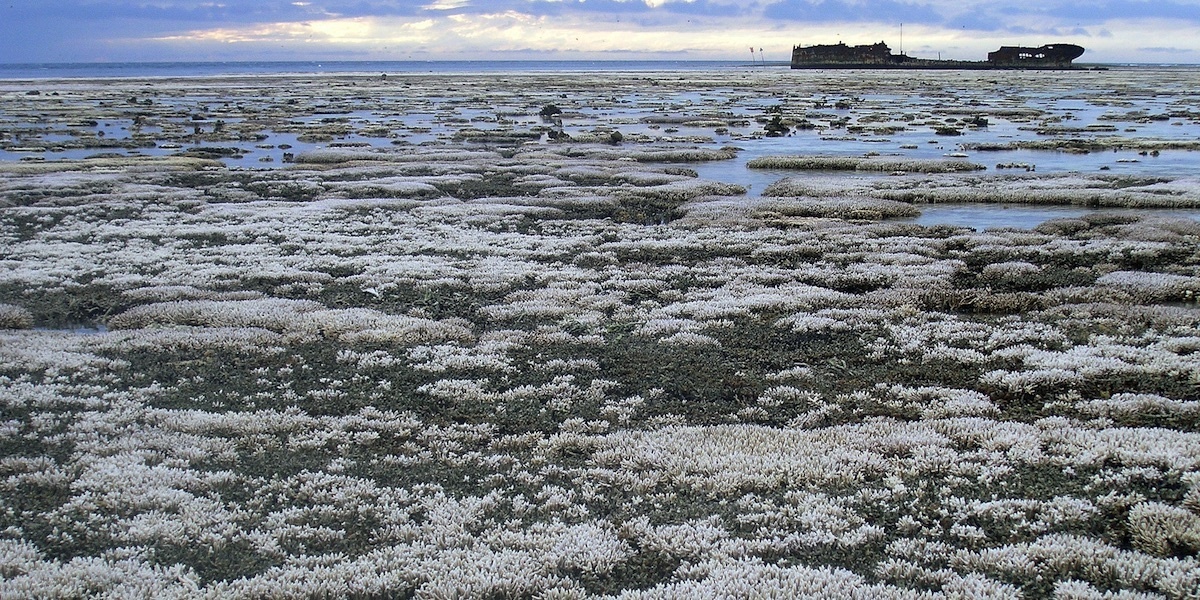
Great Barrier Reef in Danger of Mass Coral Bleaching Events Every Two Years

The
Great Barrier Reef—Australia’s remarkable but imperiled natural wonder—is under risk of repeat coral bleaching events unless greenhouse gas emissions are slashed, Australia’s Climate Council warned Thursday.
The new report, Lethal Consequences: Climate Change Impacts on the Great Barrier Reef, determined that by 2034, the extreme ocean temperatures that led to the mass bleaching events of 2016 and 2017 may occur every two years if emissions continue on current trends.
Climate Councilor and ecologist Lesley Hughes explained that the unprecedented mass coral bleaching in 2016, which killed off nearly a third of the reef’s coral, is occurring more often.
“In the 1980’s, we would see a 27-year gap on average in between bleaching events around the world. Now, they’re hitting every six years on average,” she said, as quoted by the
Australian Associated Press.
Under continued heat stress, corals expel the algae that live in their tissues and give them their stunning colors, leaving behind a stark white skeleton.
“This is not sustainable because repeated bleaching events will continuously set back recovery,” the report states.
The new report finds that the damage to the reefs may be irreversible and that coral mortality has led to a decline in the diversity of fish species and in the number of juvenile fish settling on the reef.
The researchers urge drastic and immediate reduction of greenhouse gas emissions, a major driver of global warming. The report says that limiting temperature rise above pre-industrial levels to no more than 1.5°C—the ambitious target set by the 2015 Paris climate agreement—is critical for the survival of reefs worldwide.
“Doing anything other than urgently and dramatically slashing our nation’s rising pollution levels will essentially sign the death certificate for the Reef as we know it today,” said Martin Rice, acting chief executive of the Climate Council in a
statement.
“Doing anything other than urgently and dramatically slashing our nation’s rising pollution levels will essentially sign the death certificate for the Reef as we know it today” – Dr Martin Rice. https://t.co/2QqYOakwPJ via @climatecouncil #climatechange #GreatBarrierReef pic.twitter.com/7CdhIlhNEh
— Climate Council (@climatecouncil) July 5, 2018
In April, the Australian government
announced it will invest more than $500 million (US $379 million) to protect the reef.
However, environmentalists have pointed out that most of the funds are going towards improving water quality, controlling outbreaks of coral-eating starfish and research—a “band-aid plan” as Prime Minister Malcom Turnbull’s fossil fuel-friendly government promotes the building of new coal mines, which fuels global warming that harms the reef.
The report states: “Whilst sediment run-off and the crown-of-thorns starfish place additional stress on an already stressed system, there is scant evidence that local management can sufficiently reduce susceptibility of corals to bleaching from marine heatwaves in the long-term. Without effectively addressing
climate change, the Federal Government’s plan will not help protect the Great Barrier Reef.”
Bill McKibben, founder of
350.org, also spoke out against the government’s plan.
“Science is well aware of what is killing coral on the Great Barrier Reef. It’s the excess heat that comes from burning fossil fuels,” McKibben said in a
press release. “If the Turnbull government was serious about saving the Reef they would be willing to take on the industry responsible for the damage. To simultaneously promote Adani’s coal mine, which would be one of the world’s largest, pretending to care about the world’s largest Reef is an acrobatic feat only cynical politicians would attempt.”

 233k
233k  41k
41k  Subscribe
Subscribe 